Bitdefender vs Trend Micro: Which Antivirus Is Best in 2025?
Both Bitdefender and Trend Micro are known for providing excellent security against fast-emerging threats. I wanted to see which one was overall the better antivirus.
I thoroughly tested each contender across 15 categories, including malware-detection capabilities, ease of use, and value for money. I found that Bitdefender outshined Trend Micro in almost every aspect.
Bitdefender provided perfect detection scores and near-perfect real-time protection. It also hosts a ton of useful extras, such as behavioral monitoring, webcam protection, and a file shredder. A bonus is that Bitdefender has a 30-day money-back guarantee, so you can try it out completely risk-free.
Try Bitdefender risk-free for 30 days!
No Time? Here’s a 1-Minute Summary of Category Winners
Trend Micro offers satisfactory malware-detection rates, but the lack of a built-in firewall significantly impacts its real-time protection capability. It also falls short in various other aspects compared to Bitdefender’s superior performance.
 |
||
| Virus Scanner | Fast virus scanner with multiple scan options. | Relatively slow virus scanner with limited scan options. |
| Real-Time Malware Protection | Detected 99.7% of all real-time threats. | Detected 98.2% of all real-time threats. |
| System Performance | Used less CPU, memory, and disk resources and improved system performance overall. | Used more CPU, memory, and disk resources but provides decent system performance. |
| VPN | 200MB per day data cap for all plans except premium. | No daily data cap, but you can’t choose servers. |
| Parental Controls | Packs more features and is easier to use. | Packs fewer features and can be a bit difficult to use. |
| Firewall | Includes a highly configurable firewall with lots of advanced features. | Doesn’t have a firewall but rather a feature that boosts Windows Defender. |
| Password Manager | Offers security features, including two-factor authentication, and more features. | Lacks security features and doesn’t have strong auto-fill capabilities. |
| Gaming Mode | Includes a gaming mode that enhances system performance while gaming. | Only provides a “Mute” mode, which silences notifications while gaming. |
| Optimization Tools | Includes a handful of optimization tools, mostly related to clearing up hard drive space. | Includes a wide range of optimization tools that significantly improve system performance. |
| Ease of Use | Desktop and mobile apps have a similar user interface and provide a seamless user experience. | Desktop and mobile apps aren’t as well-integrated, providing a choppy overall user experience. |
| Other Features | Offers many useful extras, including behavioral monitoring, webcam and audio protection, and a file shredder. | Offers “Fraud Buster,” an anti-phishing feature. |
| Customer Service | 24/7 live chat, email support, phone support on all plans, and fast response times on all channels. | 24/7 live chat, email support, limited phone support, and slower response times across channels. |
| Price | Provides excellent overall value for money, considering it’s so feature-packed. | Provides decent value but can be expensive for the lack of features. |
| Free Version | Has a free version, and all plans come with a 30-day free trial. | Doesn’t have a free plan and provides a 30-day free trial on 3 plans. |
| Money-Back Guarantee | Provides a 30-day money-back guarantee, with an average refund time of 5 days | Provides a 30-day money-back guarantee with an average refund time of 7 days. |
Try Bitdefender risk-free for 30 days!
How I Tested and Compared Bitdefender vs Trend Micro
- Virus Scanner — I checked which scan options each contender provides and tested each scan’s detection rate.
- Real-Time Malware Protection — I looked at each antivirus’s real-time protection features and their real-time protection scores.
- System Performance — I used each antivirus extensively to see which one slowed my system down more.
- VPN — Both antiviruses offer a build-in VPN. So I tested each VPN’s security, unblocking capabilities, and speed on close, mid-range, and distant servers.
- Parental Controls — I looked at what parental features each antivirus offered and tested their ease of use.
- Firewall — I gauged each firewall based on the online protection level and the number of advanced features it packs.
- Password Manager — I judged each password manager based on encryption protocols, ease of use, and advanced auto-fill function.
- Gaming Mode — I tested each contender’s gaming mode based on how efficiently it allocated system resources while gaming.
- Optimization Tools — I considered how many optimization tools each antivirus offers and how much they improve system performance.
- Ease of Use — I used each antivirus’s desktop and mobile apps and paid attention to the overall user experience.
- Other Features — I accounted for extra features each antivirus offers in their plans and the usefulness of these features.
- Customer Service — I thoroughly tested each antivirus’s customer support options to see how fast and helpful they were.
- Price — I compared the price plans of each antivirus to see which contender offers a better value for money.
- Free Version — I checked if the antiviruses have any free plans or free trials for paid plans.
- Money-Back Guarantee — I tested the contenders’ refund policies to see which one refunds my money first.
Try Bitdefender risk-free for 30 days!
1. Virus Scanner — Bitdefender Offers Perfect Detection and Is Faster
Bitdefender’s virus scanner outperforms Trend Micro’s virus scanner in nearly every aspect. For starters, it provides more scan options: Quick Scan, System Scan, Vulnerability Scan, Rescue Environment Scan, and Custom Scan. In comparison, Trend Micro only offers 2 scan options — Quick Scan and Full Scan.
I ran Bitdefender’s Quick Scan, which scanned over 14,000 files in under 6 minutes, which isn’t bad.
Its System Scan (full scan) took almost an hour to check through 950GB of data on my hard drive (in comparison, Norton’s full scan took 12 minutes). However, it only took 10 minutes the next time I ran the full scan. Bitdefender has an intelligent virus scanner that marks files safe, making each subsequent scan faster than the last.
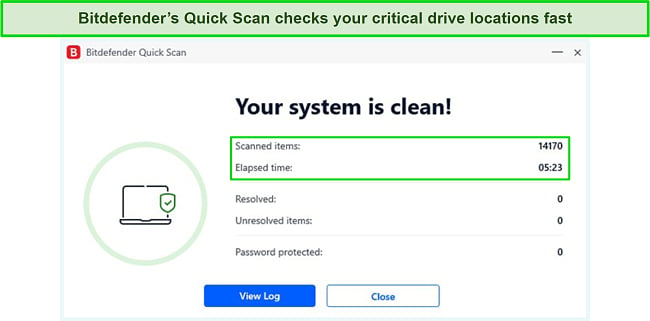
Bitdefender’s Vulnerability Scanner updates your operating system and all apps on your device to remove any security vulnerabilities a hacker can exploit. It spotted 10 vulnerabilities on my computer, and I could fix them all from within Bitdefender’s dashboard instead of manually updating each app.
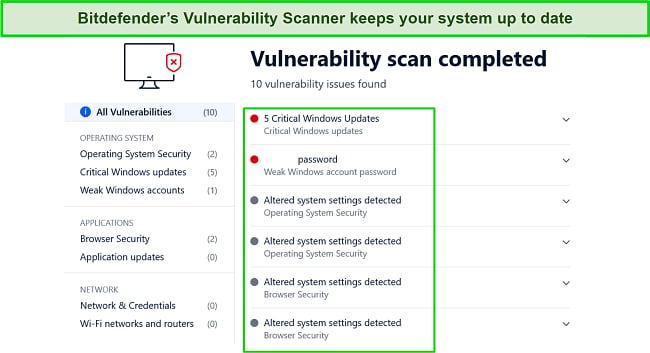
I ran Trend Micro’s Quick Scan, which scanned 1,276 files in 6 minutes — that’s fast, but it checked significantly fewer files compared to Bitdefender’s Quick Scan. I liked that Trend Micro automatically detected performance optimization issues on my PC, including unprotected passwords on my browsers.
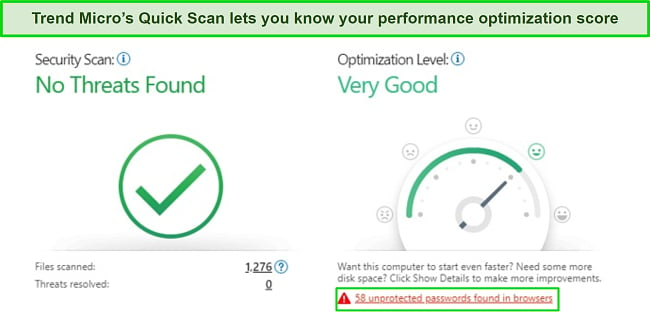
Next, I ran Trend Micro’s Full Scan, which checked over 500,000 files in 20 minutes, slower than Bitdefender’s full scan, which checked about 2.2 million files in an hour.
I was happy to discover that, like Bitdefender, Trend Micro also quickens subsequent scans by marking files safe. The second time I ran the full scan, Trend Micro scanned 8,180 files in about 10 minutes.
Bitdefender didn’t give me any false positives in the 10 full scans I performed on multiple devices, but Trend Micro occasionally flagged safe files.
Both Bitdefender and Trend Micro include excellent virus scanners, but overall, Bitdefender provides multiple scan options, and its scans are faster.
Virus Scanner Winner: Bitdefender
Try Bitdefender risk-free for 30 days!
2. Real-Time Malware Protection — Bitdefender Provides Near-Perfect Real-Time Protection
After extensively testing each antivirus’s real-time protection capabilities, I learned that Bitdefender blocked 99.7% of all real-time threats I threw its way. In comparison, Trend Micro lagged at 98.2%, which is still above the industry average of 97%, but nowhere near Bitdefender.
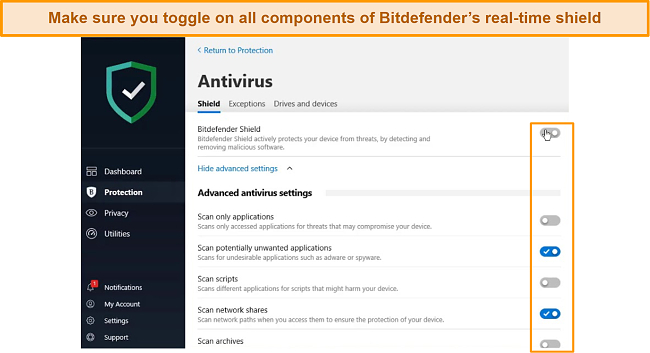
I tried opening dozens of potentially dangerous websites and downloading malicious files from the web, and I’m happy to report that Bitdefender blocked all of them. It also blocked me from opening URLs contained in spam and phishing emails.
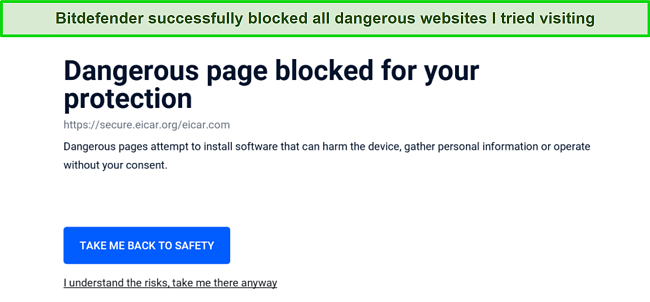
The only area where it fell short was detecting zero-day malware, which are recently-released viruses not recorded in most virus databases. I subjected it to a handful of zero-day viruses hidden inside zip files, and it failed to detect 3 out of 7 of them. Only Norton achieved a 100% detection score in my real-time tests.
Trend Micro offers a browser extension that prevents you from opening malicious sites and URLs in scam emails. I was happy to discover it blocked me from opening all the potentially dangerous websites and warned me that I was connected to a risky network.
Its “Fraud Buster” kept me safe from all phishing and scam emails and even generated detailed reports for every email I opened. This gave me peace of mind that any URL I opened would be safe and pre-checked by Trend Micro’s Fraud Buster.

Overall, Trend Micro gave me a real-time protection score less than that of Bitdefender. It failed to detect 5 out of 7 EICAR virus sample files I pitted it against, most of which were hidden inside zip folders.
Real-Time Malware Protection Winner: Bitdefender
Try Bitdefender risk-free for 30 days!
3. System Performance — Bitdefender Has Minimal Impact on Performance
After rigorously testing both contenders, Bitdefender turned out to be less resource-intensive than Trend Micro. However, I must say Trend Micro didn’t weigh down my PC much to start with.
To measure how much each antivirus impacted my system performance, I compared my baseline CPU, disk, and memory utilization levels before and during the scans. Without a scan, Bitdefender and Trend Micro were using 9% and 17% of my CPU resources, respectively. With the scan running in the background, however, these numbers spiked to 16% and 33%.
The more important question is how these numbers translated into my user experience. I have a high-end PC with a powerful CPU, so I didn’t experience any lag or noticeable slowdown with both contenders.
However, when I tried installing resource-heavy apps like AutoCAD and MS Office, I noticed a significant lag with Trend Micro. With Bitdefender, I could stream Netflix while installing those programs with the full scan running in the background. I also noticed that Bitdefender’s subsequent scans were progressively less resource-intensive.
Remember that you may experience a more substantial slowdown depending on your hardware and other running programs. Having said that, my test results indicated that Bitdefender had less of an impact on my system performance than Trend Micro.
System Performance Winner: Bitdefender
Try Bitdefender risk-free for 30 days!
4. VPN — Trend Micro’s VPN Is Slightly Better
I was highly disappointed after using the VPNs offered by Bitdefender and Trend Micro, but Trend Micro takes the lead in this round just because it doesn’t have any data caps. I wouldn’t recommend using either VPN because they don’t provide consistently high speeds nor have good unblocking capabilities.
Bitdefender’s VPN would have been great if it didn’t have a data cap of 200MB per day, making the VPN completely worthless. I used up my 200MB by running a few speed tests on Ookla.
To get past this data cap, you’ll have to get Bitdefender’s premium VPN, which I don’t think is worth the upgrade because you still won’t get good unblocking capabilities. When traveling abroad, I couldn’t access my home content on Disney+ and HBO Max accounts. Therefore, I recommend getting a premium VPN like ExpressVPN, which provides excellent speeds, security, privacy, and unblocking capabilities at a similar price tag.
In comparison, I was happy to discover that Trend Micro’s VPN didn’t have a data cap, but, unfortunately, it offered limited functionality. For one, you can’t pick and choose the servers you want. Instead, the VPN will choose the best server for your location. That’s a serious problem for users traveling abroad who wish to access their home content. On a more positive note, I got great speeds on the servers it connected me to.
I conducted a DNS leak test for Trend Micro’s VPN, which repeatedly passed in flying colors. I discovered no data leaks, meaning Trend Micro did a splendid job keeping me anonymous at all times. I also liked its WiFi protection feature, which turns any public hotspot into a virtual private network with a bank-grade encryption protocol. However, this feature comes at the cost of speed, so make sure you use it only when you really need to.
In summary, Bitdefender’s VPN could have been better if it didn’t have limited data. Therefore, Trend Micro’s VPN wins this round despite its limited functionality and efficacy. I don’t personally recommend using either of them. If you’re serious about your privacy, I strongly recommend using ExpressVPN or a top antivirus like Norton that has an excellent build-in VPN.
VPN Winner: Trend Micro
Try Trend Micro risk-free for 30 days!
5. Parental Controls — Bitdefender’s Parental Controls Are Easier to Use
I was happy to learn both Bitdefender and Trend Micro offer parental controls. After using them extensively, I found Bitdefender’s parental controls more feature-rich and easy to use.
The first thing I noticed about Bitdefender’s parental controls feature was its clean user interface. Every feature is neatly arranged inside an overall intuitive dashboard, making it easy to navigate even for beginner users. To start using parental controls, you’ll first have to create a child profile.
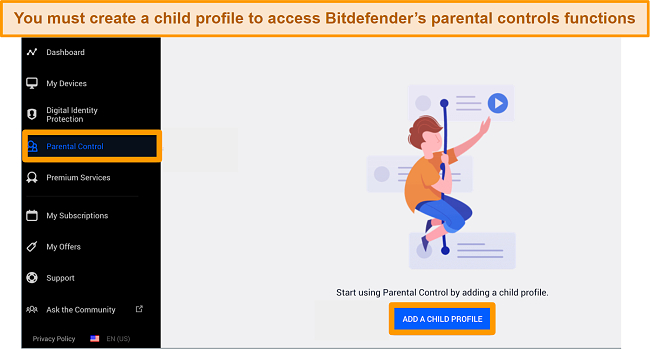
After setting a child profile, I could track every little detail about the child device’s usage. I could track the browser history and how much time the device spent online. I blocked adult websites and streaming platforms on the child’s device remotely in just a few clicks. I also placed screentime restrictions for each device.
Bitdefender’s parental controls are simple to use, but I found two flaws while using them. First, you can only link 1 device to each child profile, meaning that if your child uses multiple devices, you can’t keep a check on them. Second, the parental controls function is markedly different for different operating systems. For instance, you won’t be able to block websites if you’re using Bitdefender’s iOS app. Similarly, the “view device location” feature is only available in Bitdefender’s mobile apps, not desktop apps.
Trend Micro’s parental controls are a bit complicated to use, but nonetheless, they offer a variety of tools to monitor your child’s online and offline activities. I especially liked that it lets you block a category or theme of websites across the board, so you don’t have to worry about your child finding an alternative to the website you blocked.
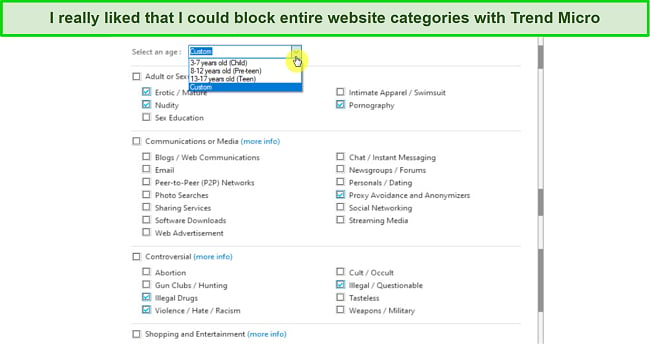
Alternatively, you can select an age group from the drop-down menu at the top. If you choose the pre-teen group (8-12 years old), Trend Micro will automatically fill out the boxes below for that age group, but you can still add or remove categories yourself.
Besides blocking a category of websites, you can block specific websites like Netflix and YouTube. You can also set up screentime restrictions, which will restrict their usage after certain hours.
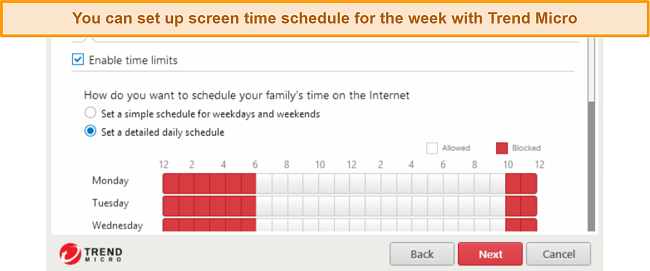
Overall, I liked using both contenders’ parental controls. Blocking a category of websites with Trend Micro was a joy, but, unfortunately, its overall user interface was a bit clunky, and it may take a while to get familiar with. On the other hand, Bitdefender’s parental controls are much easier to use, and even if you can’t block websites by category, I think the overall user experience counts more.
Parental Controls Winner: Bitdefender
Try Bitdefender risk-free for 30 days!
6. Firewall — Bitdefender’s Powerful Firewall Keeps Threats at Bay
Bitdefender includes a capable firewall with advanced features, contributing to its near-perfect real-time protection. However, you’ll only get the firewall with Bitdefender’s “Internet Security” and “Total Security” plans.
In comparison, Trend Micro doesn’t have its own firewall but rather a “Firewall booster,” which enhances Windows native firewall (Windows Defender). I wasn’t happy to learn this because no matter what, Windows Defender lacks the features needed to provide perfect protection. I’d have preferred to see Trend Micro offer its own firewall.
Bitdefender’s firewall protected me against all threats I exposed it to. From downloading malicious files to clicking shady URLs in scam emails, it kept all online threats well at bay. When it’s on “Alert Mode,” it analyzes all apps installed on your computer or phone and monitors if they’re behaving suspiciously.
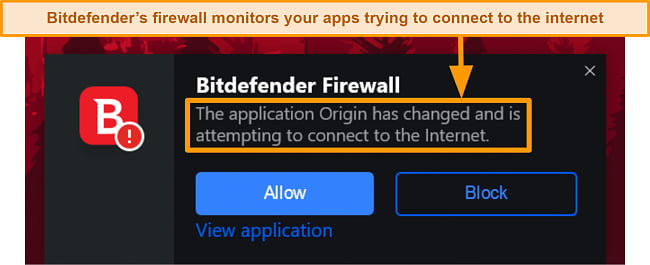
I also liked the firewall’s “Stealth Mode,” which keeps your device hidden from other users when you’re connected to a public network. This feature gave me peace of mind that I’m hidden from all prying eyes and potential hackers while using public WiFi.
Overall, Bitdefender’s firewall hosts a range of advanced features and is also easy to use. It blocked every online threat I pitted it against and even monitored if any apps on my computer had been infected or were behaving oddly. It gave me complete control over my privacy, including my incoming and outgoing internet traffic.
Firewall Winner: Bitdefender
Try Bitdefender risk-free for 30 days!
7. Password Manager — Bitdefender’s Password Manager Is More Secure
After using each contender’s password manager, I found Bitdefender’s password manager more feature-rich and secure. Trend Micro’s password manager has all the essential features, but it lacks advanced form-filling capabilities and security.
I was thrilled to learn I could save unlimited passwords on Bitdefender’s password manager. Most antivirus password managers cap the number of passwords you can store, which is a deal-breaker for me. I saved user credentials for dozens of my accounts, including Reddit, Instagram, Netflix, Prime Video, Gmail, and more.
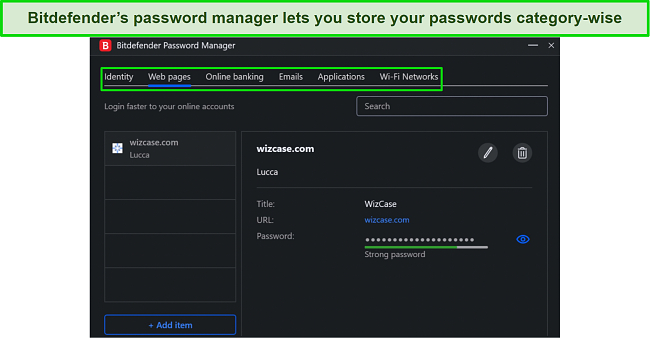
Bitdefender’s password manager also has some of the most advanced form-filling capabilities I’ve seen, especially considering it’s a bundled password manager and not a completely standalone product.
I entered my personal details, including my full name, passport number, social security number, driver’s license, and more in the “Identity” tab. I also entered my bank account details and credit card numbers in the “Online banking” tab. Having done that, filling out complex and lengthy forms was a breeze.
Trend Micro’s password manager isn’t as well-integrated as I had hoped. While it includes essential password management features, such as AES 256-bit encryption, it lacks two-factor authentication. That means your password vault is vulnerable and can be used by someone else without you knowing.
It was easy to save my passwords with Trend Micro’s password manager. I also liked its “Secure Notes” feature, which lets you save sensitive information. What disappointed me, however, was its poor auto-fill capabilities. I could only save a few details under its “Form Filling” section.
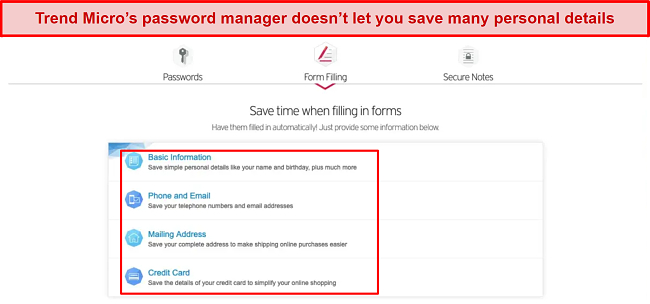
Overall, Bitdefender’s password manager is more powerful, configurable, and well-integrated. It can store more details, thus providing better auto-fill functionality. It’s also more seamless to use than Trend Micro’s. For instance, it lets you import your passwords from various password managers, including 1Password and LastPass. If you wanted to import passwords with Trend Micro you’d be stuck doing so manually.
Password Manager Winner: Bitdefender
Try Bitdefender risk-free for 30 days!
8. Gaming Mode — Bitdefender Hosts a Powerful Gaming Mode
I thoroughly enjoyed using Bitdefender’s “Game Profile” smart feature, which automatically gets toggled on when you start gaming on your PC. It also allocates your system resources so that you can enjoy a seamless and immersive gaming experience. Comparatively, Trend Micro’s gaming mode only includes a “Mute” feature, which silences all notifications while you’re gaming.
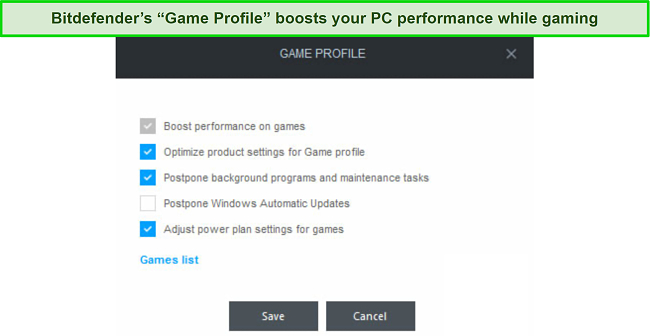
I was pleased with Bitdefender’s Game Profile, which suspended background programs and processes while gaming. As a result, I could play the most resource-heavy games on my PC, like Forza Horizon 5 in UHD, without getting any frame drops whatsoever.
Trend Micro has a gaming mode, but, unfortunately, it’s not built to boost your system performance. Instead, Trend Micro features a “Mute mode” that silences all non-critical notifications while you’re gaming. Using Trend Micro’s gaming mode, I couldn’t play Forza Horizon 5 in UHD without frame drops. In conclusion, Bitdefender’s gaming mode is far superior to Trend Micro’s.
Gaming Mode Winner: Bitdefender
Try Bitdefender risk-free for 30 days!
9. Optimization Tools — Trend Micro Offers a Better Tune-up Facility
Both Bitdefender and Trend Micro include excellent optimization tools, but, after using them, I found Trend Micro’s tune-up facility to be more feature-rich. Its “PC Health Checkup” tool informs you about security vulnerabilities, unneeded files on your system, and potentially incompatible programs.
Bitdefender’s “One Click Optimizer” offers 3 optimization tools: Disk Cleanup, Registry Cleanup, and Privacy Cleanup. I ran the disk cleanup, which freed up 67.45MB of space on my hard drive by removing 29 junk files from my system. I could see these files by clicking the “View details” button on the right.
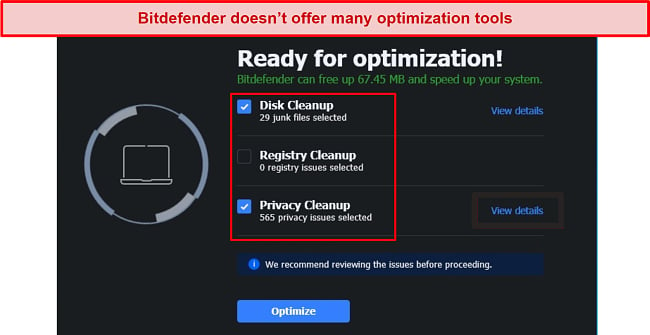
Although the One-Click Optimizer lets you review the issues it has detected, I couldn’t see the exact details I wanted to. For instance, it flagged a corrupt software file on my PC, but it only gave me the file’s folder location and didn’t tell me the file name. This was rather frustrating because I couldn’t see what I was deleting. I didn’t remove that file because I didn’t want to risk deleting a system file.
Trend Micro’s PC Health Checkup was a joy to use. I used it to check my PC for any vulnerabilities, and the best part is that you can just run a quick scan to identify all your system performance issues. I fixed all the issues it identified and noticed a more significant boost in my performance than I had with Bitdefender.
It was a delight to see many optimization tools packed in Trend Micro’s PC Health Checkup. It has every possible tune-up tool you need, from removing junk files and browser cookies to scanning for PUPs and security vulnerabilities.
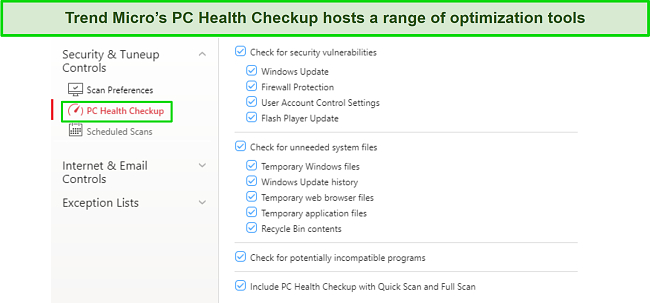
In summary, Trend Micro’s PC Health Checkup was significantly better than Bitdefender’s One-Click Optimizer. It greatly improved my computer’s performance to the point that I could easily multitask with multiple resource-heavy apps and push my PC to higher utilization levels.
Optimization Tools Winner: Trend Micro
Try Trend Micro risk-free for 30 days!
10. Ease of Use — Bitdefender Is More User-Friendly
After extensively using the desktop and mobile apps for each contender across multiple operating systems, I found Bitdefender easier to use. Though there are some other top antivirus options with integrated apps for platforms like iOS. Both its desktop and mobile apps share a clean, intuitive, and easy-to-navigate user interface, making it an excellent choice for non-tech savvy users.
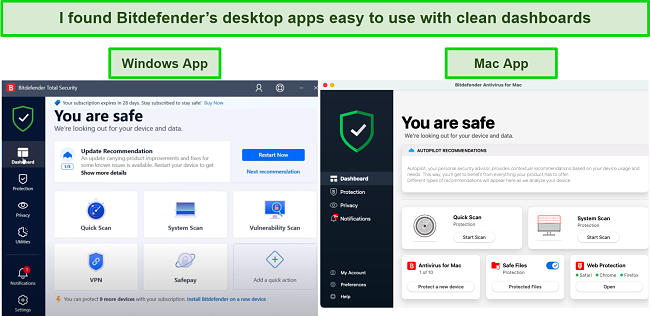
Bitdefender’s mobile apps were equally as user-friendly as its desktop apps. The Android and iOS apps share a similar user interface, making them easy to use across multiple operating systems. I liked that when I started using its Android app, it gave me a quick overview of all the features on the app and what they do.
In comparison, Trend Micro’s desktop apps were a bit clunkier to use, mainly because they aren’t as well-integrated, and the user experience isn’t as seamless as I had hoped. Installing it was a bit complicated, but using it wasn’t that difficult once it was set up.
Strangely, though, the VPN and WiFi Protection features don’t come installed by default like the Pay Guard feature. You have to install them separately by logging into your web account. However, I’m happy to report that Trend Micro’s mobile apps on iOS and Android took less than a minute to install, but weren’t as friendly to use as some of the other iOS-based antiviruses I’ve used.
Overall, Bitdefender’s apps were far easier to use and provided me with a seamless user experience throughout my testing.
Ease of Use Winner: Bitdefender
Try Bitdefender risk-free for 30 days!
11. Other Features — Bitdefender Offers Many Useful Extras
Bitdefender provides way more extra features than Trend Micro, namely behavioral monitoring, webcam and audio protection, and a file shredder.
Bitdefender’s Behavioral Monitoring tool offers comprehensive protection against ransomware, which is the type of virus that corrupts your sensitive files and asks you for a ransom before recovering your files.
Bitdefender’s behavioral monitoring constantly monitors your files, preventing them from being altered or corrupted. Its Ransomware Remediation tool can decrypt your data without paying the ransom.
Apart from that, Bitdefender’s Anti-spam feature links to your Outlook account and filters out your junk email. Sometimes, an important email can end up in the junk folder. With this feature, you can mark known email addresses never to be flagged as scams. You can also submit samples of legitimate spam emails to Bitdefender’s Anti-spam tool to train it better.
I’m a big fan of Bitdefender’s webcam and audio protection, which looks out for any incoming unknown connections trying to connect or hack into your webcam or mic, as these are very easy to access. This feature reassured me that a hacker couldn’t hack my webcam and microphone. However, this feature is absent on Bitdefender’s Mac app.
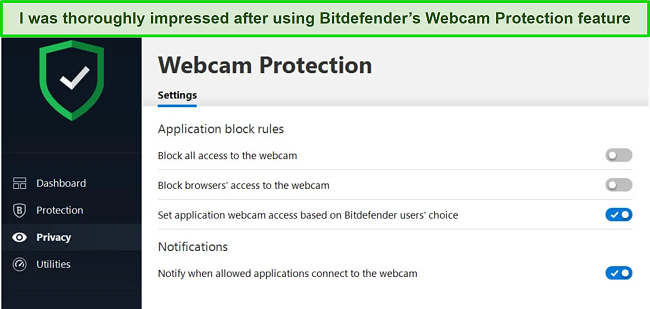
Bitdefender also provides a file shredder that destroys files without a trace. Simply deleting files (even from your recycle bin) doesn’t mean a hacker can’t recover them. Therefore, I recommend you use Bitdefender’s file shredder to destroy them beyond recovery. If you don’t want to delete sensitive files, you can use its “Safe File” feature, which hides your files in a personal vault that can’t be accessed without your permission.
In comparison, Trend Micro only offers one helpful feature — Fraud Buster, an anti-phishing tool that shields your email inbox from phishing attempts and scam emails. I used it, and Trend Micro blocked every scam email I threw its way. However, I’d have liked to see Trend Micro offer more useful extras.
Overall, Bitdefender is lightyears ahead of Trend Micro when it comes to extra features. I’ve seen only a few antiviruses (like Norton, McAfee, and TotalAV) that provide such a wide array of additional features.
Other Features Winner: Bitdefender
Try Bitdefender risk-free for 30 days!
12. Customer Service — Bitdefender Offers Fast Support on Multiple Channels
I was happy after trying out the customer support options that Bitdefender and Trend Micro offered. Both contenders provide superb customer support, but the only reason Bitdefender wins this round is that it provides phone support for all paid plans. In contrast, Trend Micro’s phone support is only available for premium users.
Bitdefender offers 24/7 live chat support, which is the fastest way to get help. All you need to do is sign in to your Bitdefender account on the website and click the live chat button. It took me under 1 minute to get connected with the agent. I asked a question about Bitdefender’s free trial and money-back guarantee and got a prompt response.
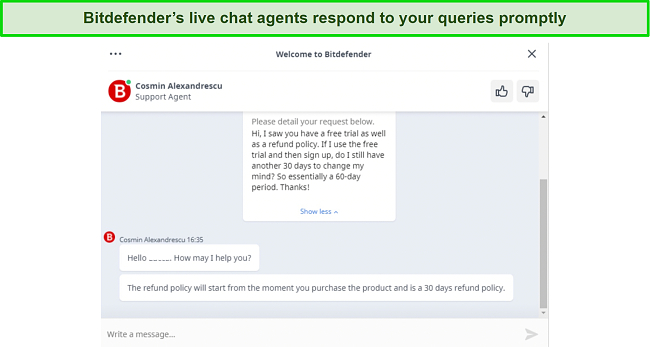
Next, I tested Bitdefender’s email and phone support. I emailed my query to the support team and got a response within an hour. That’s pretty fast, considering most other antivirus support teams took between 5 to 10 hours to get back to me.

Bitdefender’s phone support is available in 17 countries and supports various languages, including French, German, Spanish, and Japanese. I called the number and had to wait for about 12 minutes before an agent took my call. The agent answered all my questions clearly and asked me if I needed help with anything else at the end of our conversation.
Overall, Bitdefender’s phone support is suitable for complex queries that require live audio feedback from the agent. Otherwise, I wouldn’t recommend using it for general questions because it takes too long to get a question answered that could be covered elsewhere. Instead, I prefer using the live chat or the community forum, which consists of comprehensive troubleshooting and how-to guides for common problems.
Trend Micro also offers a 24/7 live chat, available in 29 different languages. I contacted the live chat agent, who was helpful and gave me clear answers throughout our conversation. However, it took me about 3 minutes to connect to him, and he wasn’t replying as promptly as I had wanted.
I didn’t like Trend Micro’s email support because it took over 7 hours for the support team to get back to me, albeit with a comprehensive answer to my query. I recommend getting phone support, which is available 24/7 for premium users and during business hours for standard users. Their agents were quite helpful as well, just expect similar wait times to Bitdefender.
Overall, I liked the customer support of both contenders, but Bitdefender’s support team was a bit more responsive than Trend Micro’s.
Customer Service Winner: Bitdefender
Try Bitdefender risk-free for 30 days!
13. Price — Bitdefender Provides Better Overall Value
After checking out the price plans of both Bitdefender and Trend Micro, I concluded that Bitdefender provides much better value than Trend Micro. That’s because it’s more feature-rich and delivers better performance across most categories mentioned above at a similar price tag.
Bitdefender offers 5 plans — AntiVirus Plus, Internet Security, Total Security, Premium Security, and Ultimate Security. Total Security provides the best value for money, as it includes all the best premium features at a reasonable cost. The only additional features the Premium Security plan offers are support for 10 devices instead of 5, priority support, and unlimited VPN usage. Total Security offers the following features:
- Supports up to 5 devices
- Device optimizer
- Firewall
- Parental controls
- Multi-layer ransomware protection
- Mobile security
At this price point, you can get Trend Micro’s mid-tier plan “Internet Security,” which doesn’t have as many features as Bitdefender’s Total Security plan. It offers:
- Support for up to 3 devices
- Ransomware protection
- PayGuard
- Parental controls
- Device optimizer
It doesn’t offer data theft protection, WiFi protection, and a password manager. Most importantly, it doesn’t have its own firewall. All these features are available on Bitdefender’s Total Security plan, which is why it provides better value for money than Trend Micro.
Of Trend Micro’s 6 plans, “Maximum Security” offers the best value. It includes all of the same features of the “Internet Security” plan but comes with the following additions:
- Coverage of 5 devices
- Real-time protection
- Password Manager
While both Bitdefender and Trend Micro offer competitive feature sets for the price, Bitdefender comes out ahead with more features and device support in its premium and mid-tier plans.
Price Winner: Bitdefender
Try Bitdefender risk-free for 30 days!
14. Free Version — Bitdefender Offers a Free Version
Unlike Trend Micro, Bitdefender includes a free plan for both Windows and macOS. Keep in mind, however, that it has serious limitations compared to Bitdefender’s paid plans. The free plan includes virus scanning, comprising the Quick Scan and System Scan options. You’ll still see the “Vulnerability Scan,” “VPN,” and “Safepay” options on the dashboard, but you can’t use them.
Bitdefender’s free trial is a barebones app that doesn’t provide complete protection for your device. If you want to use one of its paid plans, I suggest you sign up for its 30-day free trial. You don’t have to enter your credit card details and can try the service risk-free.
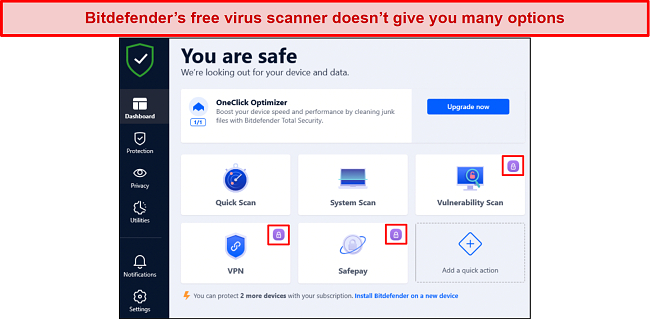
Similarly, you can test some of Trend Micro’s plans with its 30-day free trial, namely Antivirus + Security, Internet Security, and Maximum Security plans. You’ll get access to all the features of these plans without any limitations, and you can modify your plan before purchasing after the free trial expires.
It’s difficult to find a reliable free antivirus, as most of the free ones are either unsafe or have limited functionality. Luckily, though, there are a few good free options that you can choose from.
Free Version Winner: Bitdefender
Try Bitdefender risk-free for 30 days!
15. Money-Back Guarantee — Bitdefender Processes Refunds Faster
Both Bitdefender and Trend Micro offer a 30-day money-back guarantee with their plans, but Bitdefender refunded my money sooner. I also noticed that filing a refund with Bitdefender was easier than with Trend Micro.
I emailed Bitdefender’s customer support team to request a refund. I got a confirmation email within 2 hours confirming my refund request, and I got my refund 5 days later. Overall, I was impressed by Bitdefender’s prompt confirmation and uncomplicated refund process.
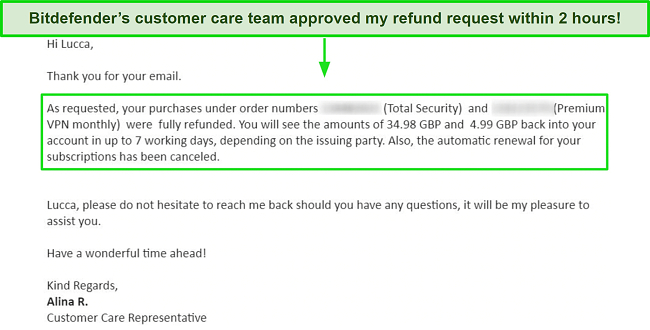
For Trend Micro, I had to initiate my refund request via its live chat, which I thought wouldn’t take that long — however, it took 20 minutes because the agent responded to my texts and tried offering me a month’s extension on my subscription.
After initiating my refund request, I didn’t get any confirmation email from Trend Micro until after 2 days, which was a bit odd, considering most other antiviruses send a confirmation email immediately. I got my money back after 7 days without any additional steps.
Money-Back Guarantee Winner: Bitdefender
Try Bitdefender risk-free for 30 days!
And the Winner Is… Bitdefender
After pitting Bitdefender and Trend Micro against each other across over a dozen categories, the results of this showdown were quite clear — Bitdefender is significantly better than Trend Micro in almost all aspects. It provides exceptional detection scores and real-time protection and is much more feature-packed than Trend Micro.
- Virus Scanner — Bitdefender
- Real-Time Malware Protection — Bitdefender
- System Performance — Bitdefender
- VPN — Trend Micro
- Parental Controls — Bitdefender
- Firewall — Bitdefender
- Password Manager — Bitdefender
- Gaming Mode — Bitdefender
- Optimization Tools — Trend Micro
- Ease of Use — Bitdefender
- Other Features — Bitdefender
- Customer Service — Bitdefender
- Price — Bitdefender
- Free Version — Bitdefender
- Money-Back Guarantee — Bitdefender
Trend Micro outshined Bitdefender in 2 areas — VPN and optimization tools. However, its VPN isn’t as robust as some of the standalone VPNs. The main reason why Bitdefender lost this round was that its VPN has a 200MB per day data cap unless you’re on the premium plan.
As for optimization tools, Trend Micro’s PC Health Checker is more feature-rich than Bitdefender’s One Click Optimizer.
In all other areas, Bitdefender outperformed Trend Micro, especially in terms of real-time protection and malware-detection scores. More importantly, Trend Micro lacks a firewall, which was a deal-breaker for me. Any antivirus without a firewall cannot provide you with comprehensive real-time protection. Therefore, I strongly recommend you try out Bitdefender with its 30-day free trial and 30-day money-back guarantee.
Overall Winner: Bitdefender
Try Bitdefender risk-free for 30 days!
How To Download Bitdefender on Your Device
- Choose your plan. Go to Bitdefender’s official website, click “For Home,” and choose the product you want to subscribe to.
![Screenshot of Bitdefender's list of plans]()
- Enter your credentials. You’ll be asked to provide your email address and credit card details to proceed to checkout.
![Screenshot of Bitdefender's checkout page]()
- Download and install Bitdefender. Download Bitdefender and install it on your PC. You’ll have to enter the product key to activate the software.
![Screenshot of Bitdefender's]()
- Activate your subscription and launch Bitdefender to protect your device!

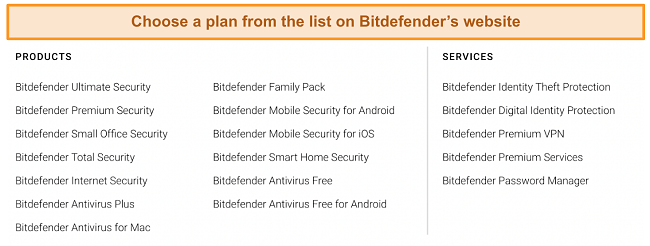
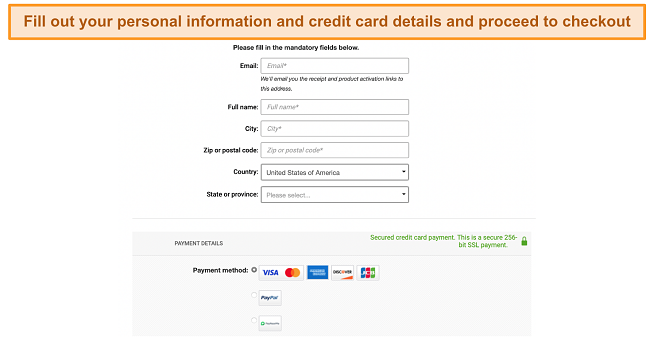
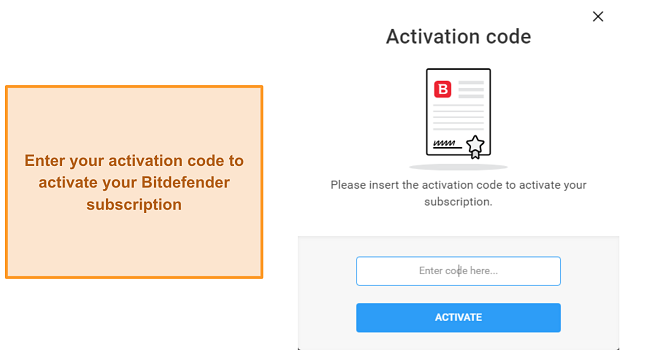



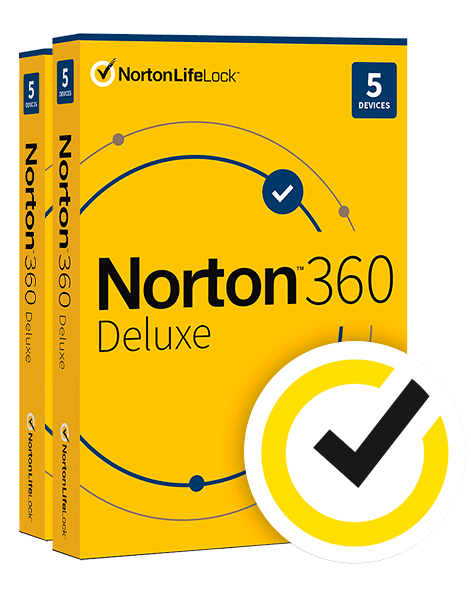
Leave a Comment
Cancel